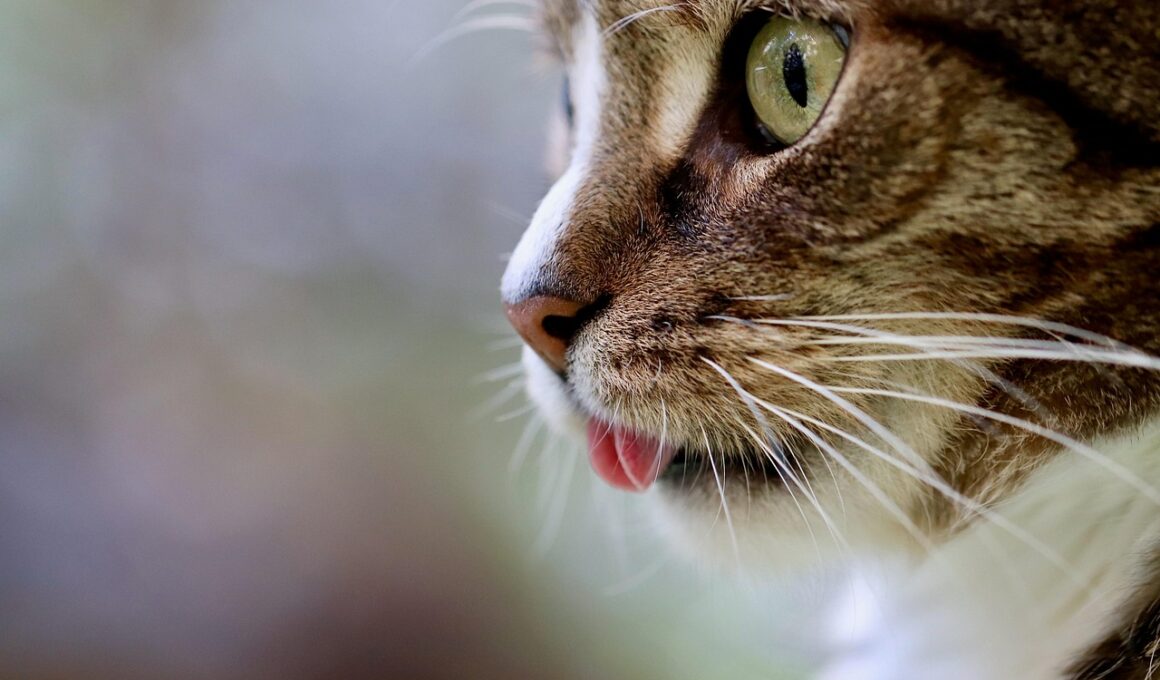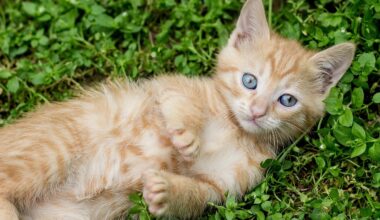Symptoms and Risks of Vitamin Overdose in Cats
Vitamin overdose in cats can lead to serious health issues. Identifying the symptoms early is crucial for ensuring your cat’s wellbeing. Over-supplementation can occur when pet owners give too many vitamins or when a vitamin-rich diet is coupled with supplements. Cats may display various signs of vitamin toxicity depending on which vitamin is in excess. Common symptoms can be lethargy, vomiting, diarrhea, and loss of appetite. Additionally, specific vitamin overdoses lead to unique symptoms; for instance, excessive vitamin A can cause bone issues and skin problems. Bile production may be affected by vitamin E overdose, leading to jaundice and lethargy. It’s essential to consult with a veterinarian if you suspect your cat may have ingested too many vitamins. Regular check-ups and blood tests can assist in identifying potential vitamin-related health issues before they escalate. Make sure to manage your cat’s diet carefully, considering both food and any additional supplements provided. Understanding the right amount of vitamins for feline health can help avoid complications from an overdose, ensuring your furry friend remains healthy and happy.
One of the most significant risks associated with vitamin overdose in cats is damage to internal organs. High dosages of fat-soluble vitamins such as A, D, E, and K can accumulate in the body. Unlike water-soluble vitamins filtered out through urine, fat-soluble vitamins can become toxic when ingested in excess. This accumulation can lead to serious health consequences, including liver failure, kidney issues, and irreversible neurological damage. Cats who consume a diet rich in fish may be at higher risk for vitamin D toxicity due to the naturally high levels found in certain fish. Symptoms of vitamin D poisoning include increased thirst, frequent urination, and hypercalcemia or elevated calcium levels in the blood. Cat owners should be mindful of the signs and seek immediate veterinary assistance if their pet exhibits any of these symptoms. Moreover, reading labels on cat food and supplements is crucial to ensure appropriate doses. Educating oneself about feline nutritional needs is beneficial in preventing vitamin overdose and ensuring overall health. Regular conversations with veterinarians will help pet owners navigate the complexities of feline nutrition to promote their cat’s health.
Understanding Vitamin A Toxicity
Vitamin A toxicity is a particularly noteworthy concern in cats. Unlike dogs, cats have a limited ability to convert beta-carotene into vitamin A, which can lead to excessive amounts from dietary sources. Common sources of vitamin A include liver and certain fish, which should be fed in moderation. Signs of vitamin A toxicity can manifest in various ways, affecting mobility and general health. Symptoms may include stiffness, limping, weight loss, and even skin issues. In extreme cases, poisoning can lead to severe complications such as bone deformities. The treatment often involves immediately stopping the source of excess vitamin A. Supportive care may include IV fluids, anti-nausea medication, and a carefully managed diet to restore balance. If owners notice symptoms of toxicity, they must seek veterinary assistance promptly. Catching vitamin A excess early can prevent more severe health impacts. When introducing new food into your cat’s diet, do so gradually to assess tolerance and avoid upsetting their nutritional balance. Keeping a close eye on any dietary changes may prevent significant health issues caused by excess vitamin A.
Vitamin D is another vitamin that can cause significant toxicity in cats. Cats are sensitive to vitamin D, and too much can result in hypercalcemia. Symptoms of vitamin D toxicity in cats include increased thirst, vomiting, and confusion. Because vitamin D is prevalent in some fish oils and supplements, it’s essential to ensure that cats do not consume excessive amounts. If you suspect your cat has ingested too much vitamin D, immediate veterinary attention is essential. A veterinarian will likely perform blood tests to assess calcium levels and recommend appropriate treatment. Treatment involves stopping the source of vitamin D and potentially providing supportive care through fluids and medications to help lower calcium levels. Additionally, owners should always be cautious when giving cat supplements, especially those claiming to be loaded with vitamins. It’s crucial to follow guidelines on dosages to avoid unintentional overdoses. By remaining vigilant and educated about feline nutrition, pet owners can help their kittens avoid potential vitamin D-related health crises. Thus, frequent check-ups and discussions with your veterinarian on vitamin needs are a proactive way to ensure your cat stays healthy.
Monitoring Vitamin E Levels
Vitamin E is vital for a cat’s health, as it serves as an antioxidant. An overdose, however, can be detrimental and lead to a range of severe health issues. Cats may develop bleeding problems or a life-threatening condition called coagulopathy, which affects blood clotting. Symptoms from vitamin E overdose include lethargy, loss of appetite, and unusual bleeding. Prompt medical intervention is necessary should any of these symptoms appear post-supplementation or dietary changes. When treating a vitamin E overdose, a veterinarian might recommend stopping vitamin E sources and providing supportive care. Ensuring your cat receives adequate nutrition without excess is critical. Awareness of any supplements given to your cat is crucial, especially those combining multiple vitamins to ensure balanced amounts are administered. Regular blood testing may also identify abnormalities in vitamin E levels. Keeping a close observation on your feline’s nutritional needs can significantly prevent the occurrence of both deficiencies and overdoses. Pet owners should be educated about vitamin importance and make conscious choices regarding dietary additions for long-term health stability.
Vitamin K also plays a significant role in the health of cats but isn’t often discussed. An overdose of vitamin K can lead to significant health risks, including issues with coagulation. Symptoms may include unusual bleeding, which can be alarming and potentially dangerous. A careful examination and prompt veterinary care are essential if overdose is suspected. Vitamin K is often found in certain green vegetables, and while it’s dangerous in excess, a balanced intake is necessary for your cat’s health. It’s crucial to ensure that any dietary supplements containing vitamin K are provided in appropriate amounts. Regular consultation with a veterinarian about your cat’s specific needs can help manage the right vitamin levels. Monitoring your cat’s health and behavior is critical to detect potential deficiencies or overdose symptoms early. If any abnormalities arise, quick action can help resolve problems before they escalate. By keeping up with balanced nutrition and checking for signs of toxicity, pet owners can prevent serious health issues caused by vitamin K. This diligence helps ensure that feline companions lead a healthy and joyous life.
Final Thoughts on Vitamin Safety
Understanding the signs and risks associated with vitamin toxicity in cats is paramount for every cat owner. Vitamins are essential but can also be dangerous if not managed correctly. Each vitamin has unique characteristics and potential health risks that must be acknowledged to keep your pet safe. Education plays an essential role in preventing overdose through careful management. Always use moderation when giving supplements and discuss any dietary plans with a veterinarian. Regular check-ups are vital, allowing for early detection of any potential health issues related to vitamin excess. Knowledge of how various vitamins impact feline health paves the way for informed decision-making. A well-balanced diet tailored for a cat’s needs can help mitigate the risks associated with vitamin overdose. By watching for symptoms and reacting swiftly, pet owners can protect their cats from adverse effects of excessive vitamins. Maintaining a healthy lifestyle for your feline companion is an ongoing responsibility. Ultimately, by prioritizing nutrition and safety, pet owners can ensure their cats live a long, healthy, and happy life.


